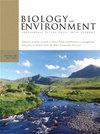利益攸关方参与爱尔兰共和国实施水框架指令的进展情况
IF 0.6
4区 环境科学与生态学
Q4 ENVIRONMENTAL SCIENCES
Biology and Environment-Proceedings of the Royal Irish Academy
Pub Date : 2022-01-01
DOI:10.3318/BIOE.2009.109.3.365
引用次数: 11
摘要
摘要:水框架指令(WFD)要求理解技术问题,并根据第14条要求利益相关者之间的对话。迄今为止,与包括公众在内的利益相关者的咨询主要是通过建立流域地区咨询委员会,以及发布题为“水问题”的文件,概述实现世界水署环境目标的重要问题。在这里,我们回顾了爱尔兰共和国在实现第14条目标方面的进展,并研究了该进展如何与利益相关者参与的一套最佳实践原则进行比较。总体而言,信息一般是可用的,但在获取背景信息、未处理(原始)数据和土地利用数据方面存在一些问题。虽然在水问题中概述了主要问题,但一些利益攸关方对这些问题提出的清晰度、覆盖面的广泛性和反馈的质量感到关切。一系列相关的公开会议出席率普遍较低。通过咨询委员会的积极参与似乎有限,没有传播信息或与利益攸关方对话的正式程序。采用和推广促进包容性的最佳做法指导原则;透明度;承诺,包括提供充足的资源;问责制;开放:对相互学习的普遍开放;改善结构以解决利益相关者的关切可能会提供一个更有效的过程。实现《世界粮食计划署》整体目标的补充办法是将《世界粮食计划署》视为一个环境管理系统;这提供了一个连续的过程,避免了不精确或不适当的目标的陷阱,但它可能提供更现实的决策支持,促进涉众的理解。本文章由计算机程序翻译,如有差异,请以英文原文为准。
PROGRESS ON STAKEHOLDER PARTICIPATION IN THE IMPLEMENTATION OF THE WATER FRAMEWORK DIRECTIVE IN THE REPUBLIC OF IRELAND
Abstract:The Water Framework Directive (WFD) requires understanding of both technical issues and, under Article 14, dialogue among stakeholders. To date, consultation with stakeholders, including the general public, has occurred mainly through the establishment of river basin district advisory councils, and following the dissemination of documents, entitled Water matters, outlining significant issues for meeting the WFD's environmental objectives. Here, we review progress in the Republic of Ireland for meeting the goals of Article 14 and examine how that progress compares with a set of principles of best practice for stakeholder participation. Overall, information is generally available, but there are some problems in accessing background information, unprocessed (raw) data and land-use data. While the main issues were outlined in Water matters, the clarity with which these issues were presented, the extensiveness of coverage and the quality of feedback were of concern to some stakeholders. A series of associated public meetings were generally poorly attended. Active involvement, through the advisory councils, appears limited, with no formal process for information dissemination or dialogue with stakeholders. Adoption and promotion of guiding principles of best practice that promote inclusiveness; transparency; commitment, including provision of adequate resources; accountability; a general openness for mutual learning; and improved structures to address stakeholder concerns are likely to provide a more effective process. A complementary approach to meet overall WFD objectives would be to view the WFD as an environmental management system; this provides a continuous process that circumvents pitfalls of imprecise or inappropriate targets, but it is likely to provide more realistic decision support, facilitating stakeholder understanding.
求助全文
通过发布文献求助,成功后即可免费获取论文全文。
去求助
来源期刊
CiteScore
1.10
自引率
0.00%
发文量
6
审稿时长
>36 weeks
期刊介绍:
The journal aims to offer a broad coverage of the subject area, including the following:
- biology and ecology of the Irish flora and fauna
- microbial ecology
- animal, plant and environmental physiology
- global change
- palaeoecology and palaeoclimatology
- population biology; conservation of genetic resources
- pollution and environmental quality; ecotoxicology
- environmental management
- hydrology
- land use, agriculture, soils and environment.
Submissions on other relevant topics are also welcome, and papers of a cross-disciplinary nature are particularly encouraged.

 求助内容:
求助内容: 应助结果提醒方式:
应助结果提醒方式:


